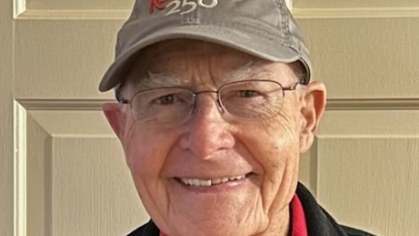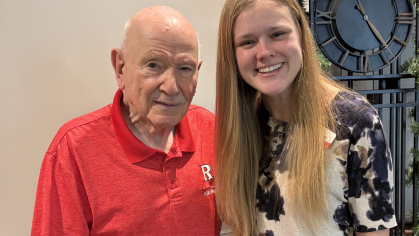Dr. Laurie L. Mulvey, who graduated from Rutgers School of Social Work with an MSW degree in 1989, considers her education at Rutgers to be the most valuable part of her entire educational experience. Now a clinical professor in sociology/criminology at The Pennsylvania State University, Dr. Mulvey developed and directs the university’s World in Conversation Center, a university hub since 2002 for training students to become conflict facilitators. The mission of "conflict facilitators" is to deploy Mulvey’s dialogue method to help small groups build solutions around contentious social problems.
Dr. Mulvey shares a glimpse into her life and the impact Rutgers had on her career.
Tell us a bit about your journey to the field of social work.
I was interested in a lot of things as an undergraduate, including communication, psychology, and law, but social work was the place where I could put all of these interests together and study something that gave me practical experience, as well as intellectual tools, to discern what was needed in any given context.
Why did you choose to study at Rutgers School of Social Work?
I had chosen to go to law school but then fortuitously met a recent graduate of Rutgers School of Social Work in 1986. I was so intrigued with his perspective and vision that I decided that I wanted to study where he studied. I applied immediately and started in Fall 1987.
How have you used your social work education since you graduated?
I use my social work education every single day. Although I went on to receive a doctorate (and studied research methods), what I do every day as a clinical professor is work with people in small groups. I have been facilitating groups, as well as studying and designing small-group interventions at Penn State ever since I graduated from Rutgers. I had amazing practicum learning supervisors that ignited me, and the hands-on learning was formative—and transformative.
As someone working in classrooms with undergraduate students ever since, I have built a vocation around “meeting students where they are” and facilitating their learning rather than telling them things.
This social work premise has defined my entire career and led to co-founding (with my husband and colleague, Sam Richards, another Rutgers graduate), World in Conversation, a Center for Public Diplomacy, where we train students to be “conflict facilitators.” This is a grassroots initiative that teaches students here and internationally how to use conflict to solve social problems. For decades, graduates have been telling me how profoundly this training has shaped their lives. That tells me that the seeds I carry from the Rutgers School of Social Work continue to be cast, planted, and harvested all around the world.
What are you currently doing for work?
I am the co-founder and director of Penn State’s World in Conversation, which has become a global center for public diplomacy that is devoted to advancing the capacity of people to solve problems with their opponents. We train conflict facilitators to use dialogue as a tool to enable people on opposite sides of a border to build solutions together. Our clinical research, educational programming, and extensive global collaborations are all directed toward bringing conflict facilitation skills into the hands (and hearts) of people at home and around the world. Having completed more than 55,000 dialogue programs (and counting!), World in Conversation became one of the largest university dialogue centers in the world—all thanks to my education at Rutgers School of Social Work.
What advice would you give to students currently studying at Rutgers School of Social Work?
Know that your practicum placement and all the courses that support it are going to be a key factor in your education and know that what you are learning prepares you in profoundly practical ways for more vocational opportunities than you can imagine. I can say that the values of social work shape every decision I make as a director, a teacher, a colleague, and as a person. "Meeting people where they are" was not a widely used phrase when I was a student. Although it has become that in certain circles, most people really don’t know how to meet people where they are. But I can say that this is the core of my work and everything I've been doing for the past three decades at Penn State. I’m grateful that I had the opportunity to learn it and practice it at Rutgers School of Social Work. As a student, you have that opportunity, so take advantage of it by pushing yourself to engage, to make mistakes, and to learn. That’s what you’re at Rutgers to do.
What are your hopes for the future of social work?
Social work is essential work. It deserves to be seen, valued, and remunerated at high levels. Full stop.



